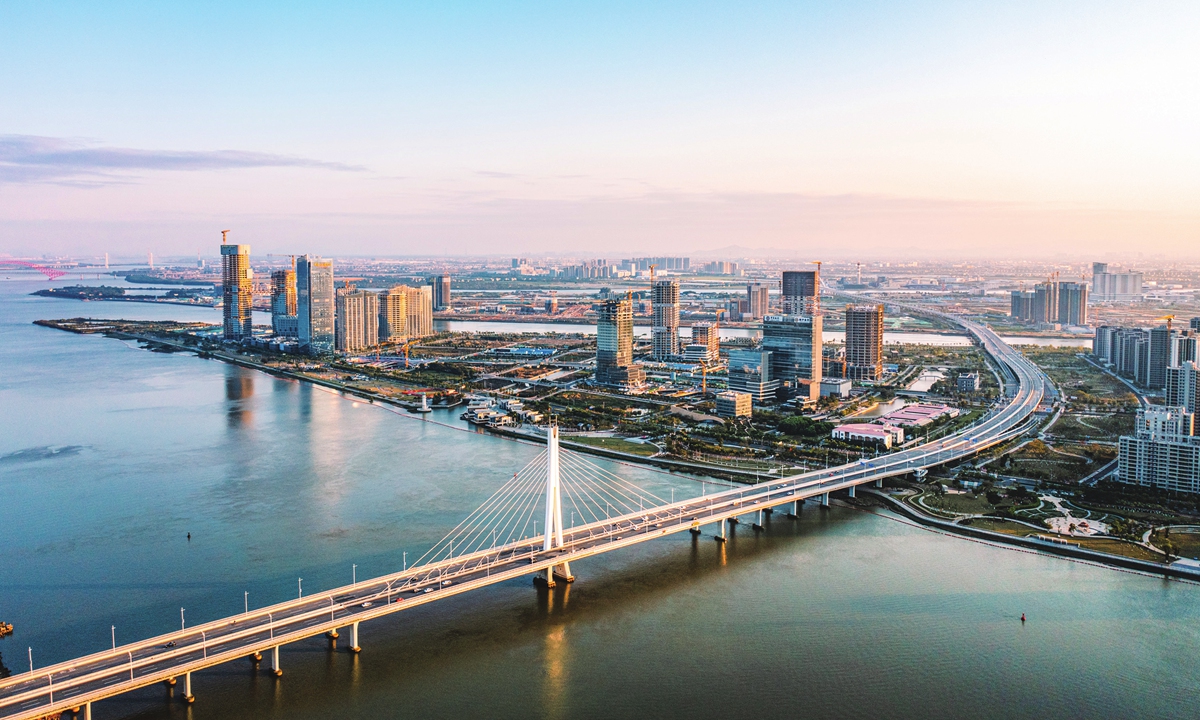
A view of Guangzhou, South China's Guangdong Province Photo: VCG
Wallenberg, a wealthy family that has lasted for 160 years, is a Nordic family business that is both low-key and secretive but comparable to the Rockefeller, Morgan and Rothschild families in the US. It is not only a lead shareholder in Ericsson, Electrolux, ABB, AstraZeneca, SEB, Husqvarna, Saab, Scandinavian Airlines and other multinational companies, such as EQT. It also controls a large number of unlisted companies and is looking for start-up "future stars" around the world with its private equity investment arm.
In the 1970s, the Wallenberg family company where they had a significant but minority interest employed 40 percent of Sweden's industrial workforce and accounted for 40 percent of the total value of the Stockholm Stock Exchange. However, the Wallenberg family believes in and abides by "to act, not to seem to be" for 200 years, making their names difficult to find on the world's richest list as their holdings are owned by the Wallenberg Foundations.
The Wallenberg family was the first to establish contact with China through its companies subsidiaries such as Ericsson, ABB, Electrolux and AstraZeneca, and its business in China continues to grow. At the beginning of China's reform and opening-up, many world-famous companies controlled by the Wallenberg family came to China, with business operations stretching back more than 40 years.
Now, the Wallenberg family is also looking for large and medium-sized enterprises and start-up enterprises with broad development prospects through private equity investment.
As Chair of the Board of Sweden-based Investor AB, a public quoted investment company where the Wallenberg foundations are a significant shareholder, Jacob Wallenberg is one of the fifth generations of the Wallenberg family. Against the background of increased exchanges between China and Europe's trade leaders, Jacob Wallenberg came to China in October, the first trip after the pandemic and the last visit.
On October 11, Chinese Vice President Han Zheng met with Wallenberg in Beijing. Noting that China's economy has picked up pace and improved since the beginning of this year, and that the country's annual growth target is expected to be achieved, Han said that China's policy of reform and opening up will remain unchanged in the course of advancing Chinese modernization, which will bring more space for the development of China-EU and China-Sweden economic and trade cooperation, according to a report by Xinhua News Agency.
Wallenberg expressed his support for maintaining sound and stable relations between Sweden and China, as well as between the EU and China, saying that he hoped to find more ways to promote dialogue among the EU, the US and China, and to assist the sustainable development of the global economy.
Wallenberg held an exclusive interview with the Global Times (
GT), sharing his understanding of the Chinese economy, where he said that China is a very important market. He also shared his view on the China International Import Expo 2023 in Shanghai.

Jacob Wallenberg
GT: What made your family decide to enter into China when the country had just opened its door to outside investment many years ago?
Wallenberg: The historical connection between Wallenberg and China was established very early. Ericsson sold telephones to Shanghai as early as 1894, 129 years ago. Now, China is the second largest economy in the world and a very mature and complete market.
But looking back, many companies, including Wallenberg's, decided to enter China a long time ago because they believed in China's future. China's rapid development in the past 40 years also proved their original vision.
In the past, the Wallenberg family often had extensive exchanges with Chinese leaders at all levels, especially in the 1970s and 1980s, which has allowed us to get to know each other and we still have that relationship to this day.
GT: We can see that China's door to the outside world is increasingly open. What are your comments on China's process of opening-up?
Wallenberg: If you want to attract foreign companies, opening-up is very important. China has chosen to continue to open itself up and welcome foreign companies, which is very good. I hope China will continue to open up.
This is my first time coming to China since 2019. In the past three years, China and other countries around the world have experienced difficult times. China is one of the most important parts of the world. When I come to China, I want to listen and learn more.
GT: There have been twists and turns in China-EU relations recently. Some voices in Europe advocate "de-risking" of economic and trade dependence on China. What do you think of the current economic and trade relations between China and Europe?
Wallenberg: We cannot ignore the fact that companies should consider building regional supply chains, no matter whether they are in Asia, America or Europe. I think this was a conscious decision to address the business environment and sustainability of the business.
However, at this moment, dialogue between China and Europe will be very important. Only in this way can we find solutions, whether in China or Europe, and companies will continue to develop in an ongoing dialogue between the two parties.
GT: The trend of China's economy being stable and improving has not changed, but some voices are seeking to undermine China's development. How do you evaluate the opportunities in the Chinese market?
Wallenberg: China is the world's second largest economy, with all industries flourishing, providing opportunities for companies from all over the world. I would say that there are many opportunities in the Chinese market. But if you want to succeed in China, as a foreign company, you must be willing to take root here for a long time and invest for the future a lot of money.
China's capital market continues to be attractive, as evidenced by the fact that some international investment institutions and companies still stick to China. Obviously, we can see that international capital remains active in the Chinese market.
China is a very important market, it is mature and complete, and foreign investment can continue to succeed here. China has sent a clear signal to the world that it will continue to create a fair and open business environment, which has given us the motivation to continue to develop in China, which we very much welcome, and it has given us the motivation to continue to develop in China.
GT: The Wallenberg family business has a history of 160 years, what do you think is the secret behind its management and longevity?
Wallenberg: I don't think there's a secret. I think the most important thing is that the family has always adhered to the long-term investment to ensure that the companies we invest in have leading competitiveness and excellent product quality with cost control capabilities. This includes the emphasis our family has put on research and development, both within individual businesses, but also at universities through the Wallenberg Foundations support of basic research.
In short, the company, no matter which industry it is active in, must be competitive with a forward-looking vision and sustainable business model.
Moreover, enterprises must be focused, and only by focusing can they be competitive. This is a universally applicable principle.
GT: At present, downward pressure on the global economy is increasing. How does the Wallenberg family business face the complex international environment?
Wallenberg: When the economy declines, companies must ensure the health of their balance sheet, control costs, and maintain cash flow.
Our companies have adhered to this principle for more than 100 years, and have not failed even in the most severe moments. As a persistent business philosophy, it is applicable to individual companies as well as when the economy generally declines. Some companies that went bankrupt during the pandemic should ask themselves whether it was just due to the pandemic or poor planning.
GT: As for the companies you invest in, such as AstraZeneca, they have been in China for many years. Why are they still participating in the CIIE?
Wallenberg: With CIIE being one of the most important platforms for exploring the Chinese market, it enables companies to share their latest research results and learn about the latest results of others. It is also an arena that can enable international corporations to increase cooperation with China.
The Wallenberg Foundations is the second largest private foundation in Europe, with nearly $240 million in annual grants provided to excellent researchers and research projects at Swedish universities, supporting Swedish innovation. This emphasizes the importance put on research and development by the Wallenberg family as a foundation for long-term competitiveness and prosperity. This is also worth for Chinese enterprises to think about.





